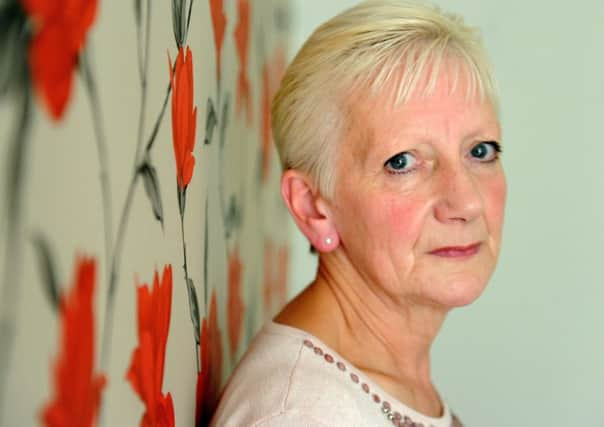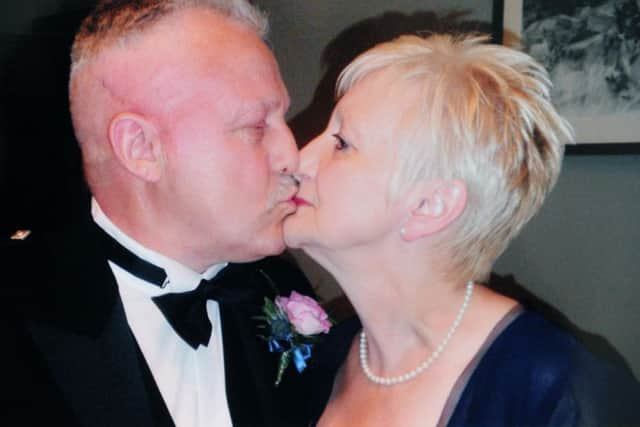Widow says hospice ended life without permission


George Watson was admitted to Marie Curie Hospice for respite care – following his brain tumour diagnosis 17 months earlier – but “never came home”.
His family said the 64-year-old, from Liberton, was going shopping and “eating three-course meals” before his rapid decline in the centre at Fairmilehead.
Advertisement
Hide AdAdvertisement
Hide AdHis widow Liz, who has worked in the care industry for 30 years, said she only realised George was on the controversial Liverpool Care Pathway - which can involve the withdrawl of medication, food and fluids - when her mum recognised the signs.


She said she would never have agreed to the care plan – which is due to be phased out in Scotland – and desperately wanted to spend more time with her husband.
She said: “When I realised what they had done to my husband and put him on that Liverpool Care Pathway, I was hysterical.
“I am not a stupid person but I never put two and two together. They made out that they went through it with me but I would never have let my husband go on anything like that.
“My husband was on it for four days. I called that place a concentration camp, depriving him of food and water. I was taking him in some ice lollies and he was so thirsty he nearly ate the stick.
“He couldn’t talk but he knew what was happening. I would tell him to blink with his eyes when I asked him things like if he was thirsty, he could hear everything that was going on. He was crying and I would say ‘I’m so sorry George that I didn’t get you out of this place’. It was too late by then.”
George, who worked as a homeless warden for Edinburgh City Council, was diagnosed with the aggressive tumour in March 2012. He underwent surgery to remove the cancerous growth before gruelling sessions of chemotherapy and radiotherapy.
Months later, the couple of 15 years were finally married at the Apex Hotel, on Waterloo Place, but their happiness lasted just six short months as doctors delivered the bombshell news that the cancer had spread to the other side of his brain.
Advertisement
Hide AdAdvertisement
Hide AdLiz, who had taken nine months off work to care for him, agreed to the respite care and expected him to return home within days but he died three weeks later on August 10, 2013.
Medical notes revealed doctors started George’s end of life treatment at 11am on August 6 and were supposed to discuss it with family at 4pm – something Liz maintains “never happened”.
The carer said the standard of nursing he received prior to that was “atrocious”, with George taking two falls while staying there.
A subsequent inspection by Healthcare Improvement Scotland upheld several complaints about the standard of care, including poor communication about his worsening condition, and made a list of recommendations. But the most recent report, from an unannounced inspection last month, found many improvements were yet to be carried out – with the watchdog making five requirements and 11 recommendations that must be addressed “as a matter of priority”.
George’s stepdaughter, Kelly MacMillan, 33, who also worked in residential care, said the experience had left her mum “shattered”.
She said: “It was so distressing to see how quickly he deteriorated in there.”
Marie Curie said it was unable to comment on care relating to an individual patient.
A spokeswoman for NHS Lothian said: “Like every health board in Scotland, NHS Lothian is following Scottish Government guidance on the Liverpool Care Pathway and phasing it out.”
Advertisement
Hide AdAdvertisement
Hide AdBut Liz said the changes were too late for George, adding: “He didn’t deserve to die like he did.
“He was the love of my life. I don’t think it’s something I will ever be able to get over.”
Care pathway
THE Liverpool Care Pathway had been intended to allow people with a terminal illness to die with dignity but that has been subject to much debate.
It can involve withdrawing medication, food and fluids to patients in the final days and hours of their life.
A review in England in 2013 found it had sometimes been “misused” by the NHS. Concerns were raised about hospitals receiving payments for increasing the number of patients placed on the LCP.
Holyrood agreed to “phase out” the LCP by the end of 2014 after hearing recommendations from the Living and Dying Well National Advisory Group.
The advisory group concluded that, when used correctly, the LCP had supported good-quality end-of-life care. However, one of the major criticisms was that the LCP did not take the patient’s circumstances into account and did not always consult relatives properly.
ANALYSIS
By Dr Jean Turner, Former anaesthetist and director of the Scotland Patients Association.
Advertisement
Hide AdAdvertisement
Hide AdThe Liverpool Care Pathway is perfectly appropriate for cases where somebody is reaching the end of their life, can no longer be kept comfortable and has no prospect of recovery.
The tragedy in England was that, in many cases, staff were using it without understanding what they were doing and it caused a great deal of grief for families.
We had a call from someone in Northern Ireland who had not been told their relative was being placed on it. In another case here in Scotland, it took the patient 11 days to pass, which was clearly distressing.